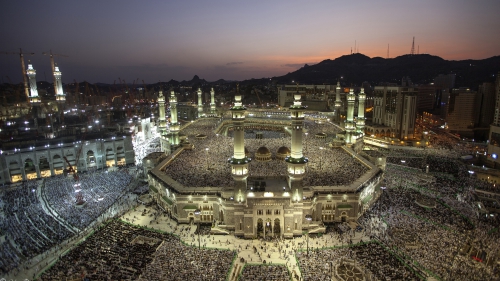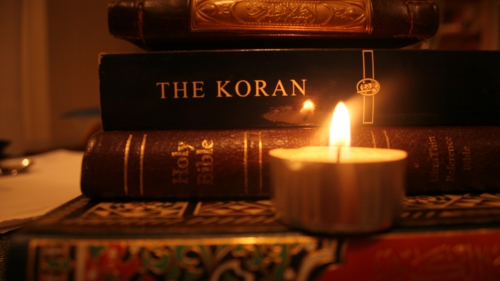Clash of Theologies
 |
In foreign policy, the George W. Bush era was the era of Samuel Huntington's thesis on the clash of civilizations. In an influential essay that became a book, Huntington argued that with the end of the Cold War, future conflicts would be fought between civilizations. The civilization he really worried about, though, was Islam. Islam, he wrote, "has bloody borders." In the 21st century, he suggested, no border would be bloodier than the one separating Islam from the West.
What's striking about Huntington's worldview is that it's identical to that of Osama bin Laden. A reading of The Clash of Civilizations would confirm the latter's own views. "You see," Bin Laden might well tell his followers waving this book in hand, "I'm right, they agree with me. We're at war with the West."
Thankfully, President Obama has put an end to the bizarre symmetry between our foreign policy and the views of Al Qaeda. For him, there's no clash between Islam and the United States. Islam is the United States. As he said last year in Turkey, "The United States has been enriched by Muslim-Americans. Many other Americans have Muslims in their family, or have lived in a Muslim-majority country. I know, because I am one of them."
True to this insight, the Obama administration is changing the focus of conversation with Muslim countries. Terrorism and radical religion will no longer be the guiding topics. A National Security Council staffer explained that "you take a country where the overwhelming majority are not going to become terrorists, and you go in and say, 'We're building you a hospital so you don't become terrorists.' That doesn't make much sense."
I agree: it doesn't. We can't let a fanatical-violent minority shape the way we interact with the majority of the Muslim world. Yet I fear that moving away from a focus on religious violence could blind us to the very real clash that fuels many conflicts.
Just because the clash of civilizations is bogus doesn't mean there's no clash. There is. But it's a clash of theologies. Current conflicts are driven by competing theological frameworks, are internal to religions and regions, and at times express themselves globally.
So while there's no battle between Islam and the West, there is a battle within Islam: a conflict between violent-fanatic understandings of Islam and a broader spectrum of Muslim worldviews over how the religion gets defined. The events of 9/11, which at first glance appear to corroborate Huntington's thesis, are better understood as an eruption of the fight over the "true" definition of Islam unto the American stage.
This same clash is found in other religions and other parts of the world. In the United States, the Christian Right rails against progressive understandings of religion and the separation of church and state. This struggle also spills onto the global scene, in the unqualified support by sections of the Republican Party for the extremist Jewish settlers of the occupied territories. You'll find the same conflict within Judaism as well. The New York Review of Books recently reported on links between fundamentalist rabbis and the growing number of religious soldiers who say they would resist orders to remove those same settlers. It's just a matter of time before this struggle over what it means to be Jewish affects American foreign policy.
Basically understood, a theology is a worldview that determines what actions are considered right or wrong. The Muslim who blows himself up in a market square is guided by a theology that makes suicide bombing a virtuous act. The same goes for the Christian who torches an abortion clinic or the Hindu mob that levels a Muslim shrine. Theology precedes virtue; theology makes right and wrong.
In the world of a clash of theologies, soft power -- the ability to persuade others without using force -- is more effective than hard power, and the battle over minds is more important than the battle over territory. To focus on theology is to focus on the worldviews that motivate behavior. It requires paying attention to local context and detail. The stakes are high. The whole world has a vested interest in which theologies win in the struggle over the definition of Islam in, say, Pakistan or Iran. The whole world also has a vested interest in which understanding of Christianity triumphs in the United States and which version of Judaism prevails in Israel. Without the right theologies in place, there won't be peace.
I know that in a time of iPhones and iPads, the word "theology" sounds old and dusty. But it's not an anachronism -- the struggle between theologies is a driver of our turbulent time.
*****
Ivan Petrella is an associate professor at the University of Miami. He is the author of The Future of Liberation Theology: An Argument and Manifesto and Beyond Liberation Theology: A Polemic. He is also the editor of Latin American Liberation Theology: The Next Generation, co-editor of Theology for Another Possible World, and co-executive editor of the Reclaiming Liberation Theology book series with SCM Press.
Topics: Foreign Policy, Interfaith, United States Of America Channel: Opinion
Views: 5654
Related Suggestions
have found out there is no conflict of theology in Islam. No
upstanding research institute will use the exception as part of
their research.
Also,For the professor to be considered fair in his research,
then he should have mentioned where the small minority of
muslims that believed in killing innocent women and children, is
basing their decision on. He would have found out that it is their
personal decision and has not to do with Islam.
The Qur'an reads: "O yo who believe, Stands out firmly for Allah,
as witneses to fair dealings, and let not the hatred of others To
make you swerve to wrong and depart from Justice. (5:8).
The Quran also equate killing of an innocence person is like
killing all humanity, and saving a person life is like saving all of
humanity. The large majority of muslims accept this as their
understanding of Islam and there is no ongoing re-
interpretation of our scriptures as you find in other religion.
Well, just recently I heard it from the descendants of Buddhist victims about the genocidal atrocities committed by Hindus on Indian Buddhists using historical records.
Arguments for or against issues must be based on facts not bull-headed rhetoric.
(and I believe He in fact is), needs people to fight, kick, scratch, and kill in order to "further His kingdom". This theology demonstrates a very small view of the Creator Himself, and I believe downright demeans His true omnipotence and therefore His character.
What I have just stated is a theological point, a worldview- it is either true, or false. It is quite simple- if you believe what I have said, you would never become a suicide bomber or rationalize murder of any kind to build the kingdom of the Creator.
The answer to violence and abuses is in fact to convert from one worldview to another. This cannot be achieved by force, but by an act of submission to the Creator's view of justice and love for others.
You said: We are actually killing each other, are we not? for what? I do not find Hindus killing Buddhists because they have different theologies. Are they?
Reply: What a blatant ignorance?! Don't you read news papers that said the news of a 'dalit' got skinned alive for killing a cow? Don't you read the news where the humans are burned alive and their worship places destroyed by Hindu extremists? Which world are you living in?!
Dialogue with Islam? Come on. Now what is anybody going to talk? Islam and Christianity have known each other for 1400 years and have been talking to each other for 1400 years. If they don't understand each other by now, can one imagine that they will be able to understand each other in a conference of say 2 weeks?. What is there to talk about?
Another way to avoid resolving the issues. It is called Analaysis Paralysis.
If it were a mere clash of theologies, then Theologians of every kind could sit down at a theological college and do all kinds of debates; nobody will be killed and no attempt will be made if it were a mere clash of theologies.
We are actually killing each other, are we not? for what? I do not find Hindus killing Buddhists because they have different theologies. Are they?
Another crap from the academic world, an intellectual moron. Sorry for being blunt. I wonder if his students are so stupid / gullible to accept this nonsense.
Just a usual way to avoid pinpointing the real issues. An apologist.





























